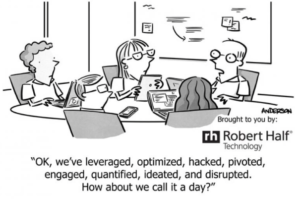 From rattlers to disrupters, and synergy to ideate, how do you keep up with the latest buzzwords? I have a hard enough time tracking the newest fashions, let alone knowing whether or not the professional terms I hear are more tired and overused than relevant, applicable, or on trend. Where do these words come from, and do they even matter?
From rattlers to disrupters, and synergy to ideate, how do you keep up with the latest buzzwords? I have a hard enough time tracking the newest fashions, let alone knowing whether or not the professional terms I hear are more tired and overused than relevant, applicable, or on trend. Where do these words come from, and do they even matter?
In “The Origins of Business Speak” Green (2014) explains how the history of business terminology was driven by the need to increase efficiency and maximize profits by emotionally engaging workers. As the focus shifted from maximizing production to understanding worker motivations, different movements in the professional world launched buzzwords that conveyed the business environment. Academics and business consultants were hired to develop corporate cultures, and they created expressions such as paradigm shift, sync up, synergy, and low-hanging fruit to better communicate and differentiate company attributes. When greed ruled the financial industry in the 1980’s, terms like bottom line, value-add, and leverage promoted the mindset of Wall Street. Human resource departments also started to use words such as streamline and operational efficiencies to soften their plans of cutting jobs and laying off employees.
The internet age has been a game changer with respect to the proliferation and expansion of innovative buzzwords. Thought leaders in various industries have established new words or fresh ways in which they are used. Where was the chad before the 2000 election? In 2004, blog was selected as the word of the year by Merriam-Webster (Kiger, 2015). For several decades, military sayings including marketing campaigns, business tactics, and executional plans for target audiences ruled the boardrooms (Storlie, 2015). In recent years, storytelling has been a emphasized as a more experiential way of communicating corporate branding, creativity, and strategies. As companies seek to think outside the box and make more of an impact, office speak has responded by adapting language to highlight more positive, even musically inspired words. Companies amplify their messages to have a cadence of promotional beats with consumers.
So what are your favorites buzzwords? Are there any terms you use despite your best intentions? Interestingly, online searches provide lists of which buzzwords you should use or not abuse every year; but while one list advises against using an overused word like synergy, another article validates its importance (Boitnott, 2016; Lazauskas, 2015). When it comes to office speak, “everyone makes fun of it, but managers love it, companies depend on it, and regular people willingly absorb it” (Green, 2015). Love them or hate them, I believe that buzzwords provide an effective way to communicate and identify with your company’s unique positioning along with your own personal brand.
References:
Boitnott, J. (2016). You still need to use these 20 smart business buzzwords. Inc. Retrieved from https://www.inc.com/john-boitnott/you-still-need-to-use-these-20-smart-business-buzzwords.html
Green, E. (2014). The origins of business speak. The Atlantic. Retrieved from https://www.theatlantic.com/business/archive/2014/04/business-speak/361135/
Half, R.(2015). IT humor: no buzzword left behind. Robert Hal Technology. Retrieved from https://www.roberthalf.com/technology/blog/it-humor-no-buzzword-left-behind
Kiger, P. (2015). The 2000s: 10 words that define a decade. National Geographic. Retrieved from http://channel.nationalgeographic.com/the-2000s-a-new-reality/articles/2000s-10-words-that-define-a-decade/
Lazauskas, P. (2015). 10 marketing terms you’re going to hear way too much of this year. The Content Strategist. Retrieved from https://contently.com/strategist/2015/01/14/10-content-marketing-buzzwords-youre-going-to-hear-way-too-much-this-year/
Pilon, A. (2015). 30 business buzzwords you should stop using. Small Business Trends. Retrieved from https://smallbiztrends.com/2015/02/business-buzzwords-to-avoid.html
Storlie, C. (2015). Military tactics that matter in marketing. Forbes. Retrieved from https://www.forbes.com/sites/onmarketing/2015/01/26/military-tactics-that-matter-to-marketing/#7f5f464f3bce


4 Responses to What’s in a Word?